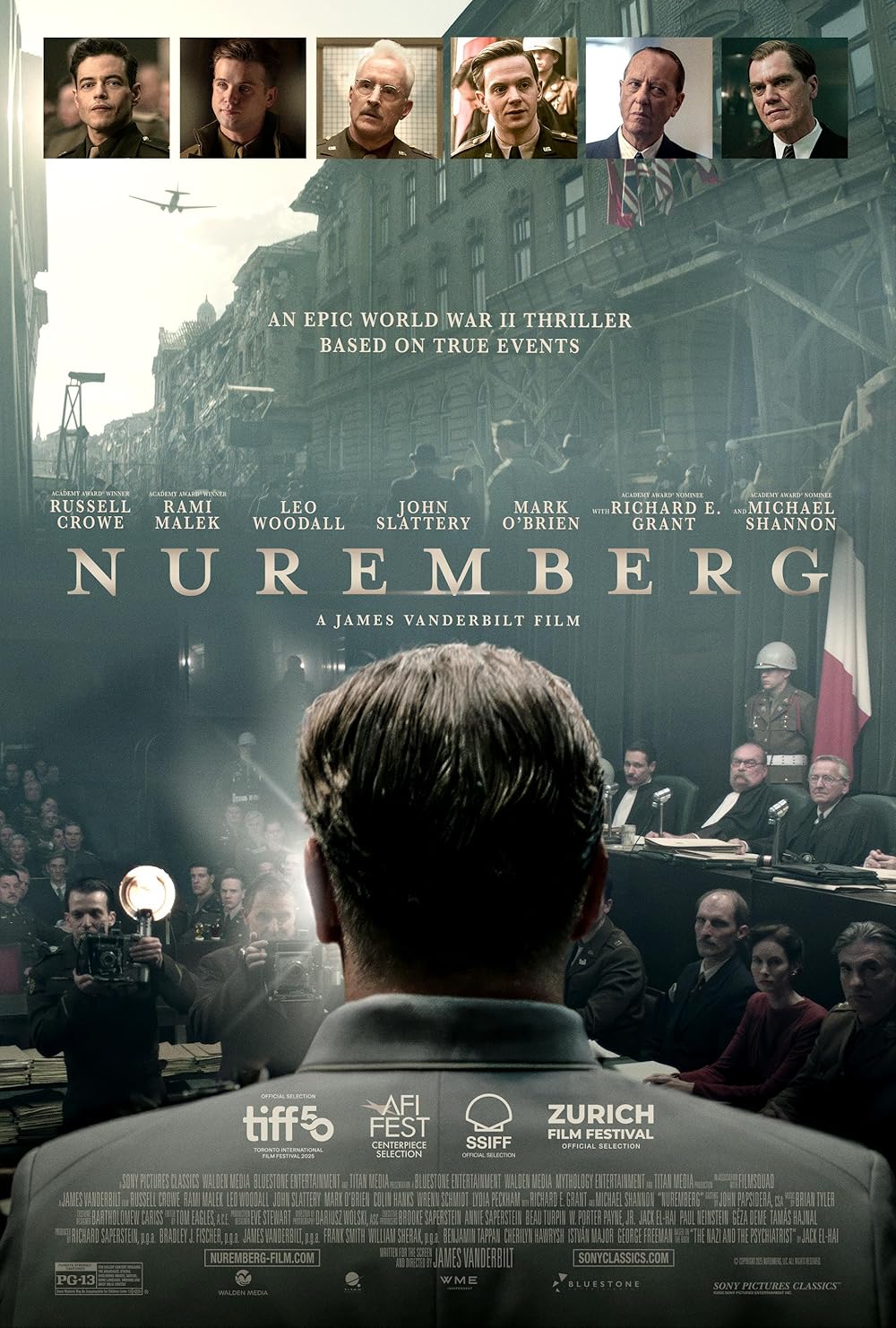Nuremberg
There is arguably no story more gripping or more important than that of the Nuremberg trials. They brought much-needed accountability to the leaders of the Nazi party while simultaneously showing the world the atrocities committed during the Holocaust. James Vanderbilt’s film Nuremberg opens with army psychiatrist Douglas Kelley (Rami Malek) flirting with a pretty woman on a train, using a magic trick to hit on her. That frivolous beginning is the earliest sign that the movie isn’t going to treat its subject with the appropriate amount of gravity. Although by no means terrible, this easily ranks as one of the biggest disappointments of the year.
Kelley has been brought in to keep tabs on Hermann Göring (Russell Crowe), Hitler’s second in command, out of fear that he and the other Nazi defendants may try to commit suicide before they can stand trial. Recognizing that Göring is extremely savvy, Kelley plots to earn his trust. Meanwhile, associate Supreme Court Justice Robert H. Jackson (Michael Shannon) attempts to figure out how he’s going to mount a case of such massive size and scope.
The sections dealing with Jackson are far more interesting than those with Kelley. Any time Nuremberg focuses on the logistics of mounting the trial, it comes alive. A scene in which Jackson curries favor with the Pope – and calls him out on the Catholic Church’s one-time support of Hitler - is a great example of the machinations required to turn the trial into a reality. Michael Shannon gives an excellent performance, making Jackson a defiant and determined figure.
Unlike him, Malek is miscast as Kelley. Hermann Göring was a flat-out monster, so scenes where the psychiatrist interacts with him should have an intense vibe similar to the Clarice Starling/Hannibal Lecter dynamic in The Silence of the Lambs. Crowe is right on target in portraying Göring’s toxic narcissism, but Malek plays his character like he’s enjoying the opportunity to toy with the Nazi leader. That essentially sucks out a lot of the necessary tension. A pointless scene where Kelley teaches him a magic trick is designed solely to set up a cheap payoff at the end.
A similar problem mars the eventual courtroom scene. Vanderbilt structures it to build to a big “gotcha” moment. This has the effect of making Nuremberg feel like a garden variety courtroom drama as opposed to an exploration of the most significant criminal trial in world history. Efforts to incorporate ironic humor compound that problem. Vanderbilt visibly strives to make a movie that’s “entertaining.” He’s turning the Nuremberg trials into a commercial enterprise designed to rouse and amuse multiplex audiences. Surely, the subject deserves better than that.
About five minutes of newsreel footage of the Holocaust aftermath is included, and this marks the most powerful section. How could it not? Use of that footage underlines how manipulative much of the picture is. Those minutes are real, and they’re injected into a movie that wants to be a commercial release, not to mention a potential awards contender. Important complexities of the case are minimized in favor of manufactured emotional beats.
In the end, it doesn’t seem like Vanderbilt was totally inclined to recreate a historical event. Several scenes, especially Kelley’s final monologue, make it clear that Nuremberg is talking about our world today. It is warning of a slide into fascism and encouraging us to demand accountability for anyone who aids in that process. A noble statement, for sure, yet one that would have been more forcefully conveyed had it not been underlined so shamelessly. Last month’s less star-studded Truth & Treason proves to be a better true story about people standing up to Nazis.
out of four
Nuremberg is rated PG-13 for violent content involving the Holocaust, strong disturbing images, suicide, some language, smoking, and brief drug content. The running time is 2 hours and 28 minutes.
© 2025 Mike McGranaghan
